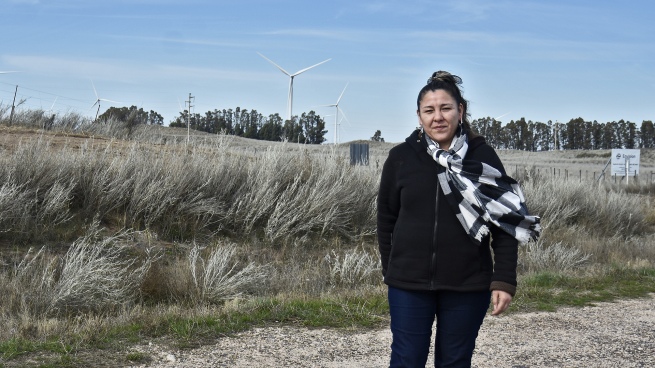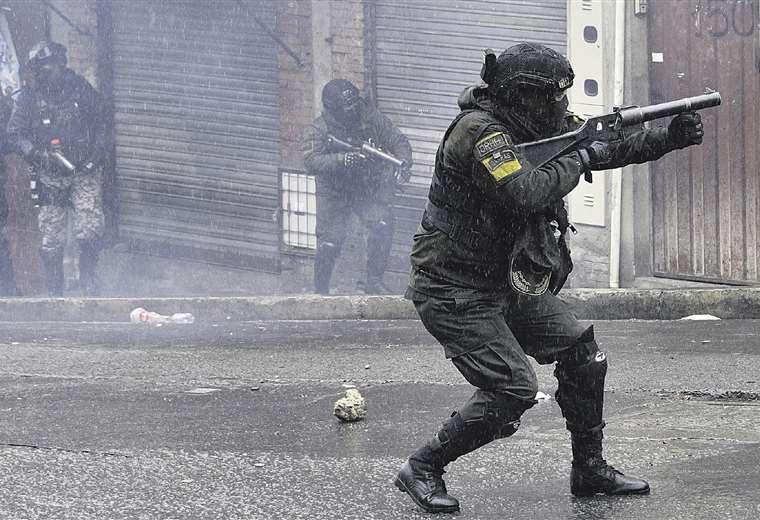The mother of Facundo Astudillo Castro walked the path that she believes her son took on the day of his disappearance in April 2020, and says there is no doubt that the death is linked to a case of institutional violence in which at least four police officers from the province of Buenos Aires are involved.
Facundo was held at a checkpoint on Route 3, on the way to Bahía Blanca, they took photos of him, took him to a police station, or two, and finally he was found dead in a crab field on August 15, 2020.
Cristina Castro walked with Télam the path that she believes her son took on the day of his disappearance in April of that same year in full isolation due to the coronavirus pandemic.
“They had marked Facundo from when he worked in the cultural hotbed,” Cristina Castro assured with anguish, while waiting for Justice to advance with the results of the latest expert reports requested by his lawyers that allow the direct involvement of the suspects. if.

the tour
According to the reconstruction that Cristina managed to carry out together with her lawyers and experts, Facundo left his house around 8 a.m. on Saturday, April 30, 2020 When isolation measures were in force in the country due to the coronavirus pandemic, he went to his grandfather’s who lives just 50 meters away and then walked towards National Route (RN) 3 bound for the city of Bahía Blanca to go to see his girlfriend, some 120 kilometers away.
“He made this journey, from my house to here,” said the woman as she walked down the dirt road where her home is located, which crosses one of the main access roads to Pedro Luro.
Once on the road, there is a first neighbor in the area that takes him to the town of Hilario Ascasubi, on the way to Mayor Buratovich, one of the first “key” points of the investigation.
“Here is an antenna that shows that Facundo activated his phone, here Facu was hitchhiking,” said Cristina and pointed to a point on the side of the road at kilometer 806 of RN 3, from where -according to the woman- there was a first person who took him in his car to a nearby inn.

“He takes it and leaves it at the Buratovich checkpoint, “explained Cristina on her tour with Télamand highlighted that he was “the first person who declared having brought Facundo.”
“Facu is stopped by the police in the area of the tracks around 10 o’clock, at kilometer 779,” said the woman, while pointing in the direction of a place on the route from where a railway track passes, the same place where Facundo was photographed by the troops at the moment of being delayed.
According to the case, for the investigators, Facundo was detained by the police officers Mario Gabriel Sosa and Jana Curuhinca to ask him for the documents, since he was not complying with the isolation ordered by the Covid-19 pandemic. In addition, they photographed his ID and they photographed him from behind next to a patrol car.
Although it could never be credited in the file, Facundo’s mother believes that he was taken there to the Buratovich unit because, based on the information collected on the officers’ cell phones, one of the policemen warns in a message that “if he jerked off, they’d get him down.”
According to the sources, in police jargon, “down” means that they had to transfer him to the unit.

Another piece of evidence that suggests the possibility that Facundo was in the facility is that there is a record that his cell phone was activated in Buratovich around 1:00 p.m.moments when he called his mother, who reported that he told her: “Mom, you have no idea where I am, you will never see me again.”
Then, as the mother explained, Facundo was released and continued on foot along RN 3 towards the town of Teniente Origone.
The case shows that a witness, identified as Siomara Floreswho turned out to be a member of the Buenos Aires Police (Curuhinca’s half-sister and Sosa’s partner), He assured that he saw the young man hitchhiking on the road and that at approximately 13 he transferred him from Buratovich to Origone.
According to the story of the victim’s mother, who said that she made the journey on foot to verify the times, Facundo arrived on foot to Origone and at kilometer 760, around 3:30 p.m., he was again intercepted by officers in a patrol that, According to witnesses in the case, they put him in the van.

Then, “Facundo appears again, beyond Origone, lying on the road,” Cristina said, which appears in the information taken from the calls made by the witnesses who alerted the police and who believe they saw him at kilometer 755. of the NR 3.
“They were the last to see Facu. These guys say he was lying down”Christina assured.
For his part, González stated in the file that he found Facundo 6 or 7 kilometers from the entrance to the town, identified him with his driver’s license, since the young man would not have had his DNI in his possession, and then photographed his license. 3:43 p.m., according to forensic data mining performed on his cell phone.
“If Facu was alive, the one who raised him was González,” assured the victim’s mother and said: “There is no more information from there, Facu disappears completely.”
The discovery of the body

His remains were found on the evening of August 15, 107 days after his disappearance in a crab field in the neighboring town of General Cerri.
His backpack was only found several days later, inside which was some of the clothing he was wearing when he was photographed by the police and burned with some type of acid, one of the enigmas never solved.
While, the autopsy carried out by experts from the Argentine Forensic Anthropology Team (EAAF) determined that the young man died as a result of “asphyxiation by submersion”although it could not be confirmed if that death was the product of a homicide or an accident.

For Facundo’s mother, her son was the victim of institutional violence and has since waged a legal battle demanding the accusation, arrest and investigation of the police officers who arrested him on April 30, 2020.
While the woman’s lawyer, Leandro Aparicio, agreed to demand the arrest of the police.
“With the volume of evidence that there is, the four that we have always mentioned have to be arrested,” the lawyer told Télam, who lamented that two years after the discovery of the body, the case still remains imputed.
But Facundo’s mother summed up her pain with the anguish on the surface: “Facu was thrown away, in times of a pandemic, when the only thing that circulated on the route were trucks, and it was precisely to discard it and get rid of it.”
















